A Comprehensive Guide To Personal Hygiene For Kids
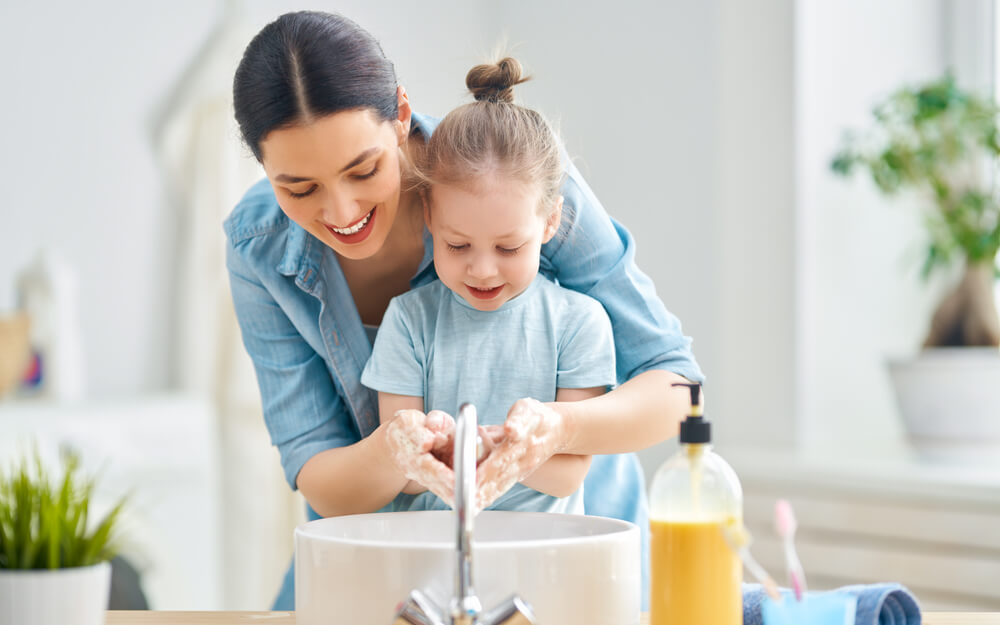
Children taught the value of good hygiene will uphold high, healthy standards in everything that they do. Personal hygiene for kids is a subject that is best approached as early as possible. Parents need to not only instill good habits but make their children understand how personal hygiene and cleanliness contribute towards total wellbeing, confident social standards, and consistently good health.
Our guide is here to help cover all the basics about developing personal hygiene habits in children. We start by defining personal hygiene and it’s different types, and then move to discussing the best healthy habits. Parents will learn many tips that help teach your kids about personal hygiene, and that should make the entire process easier.
Contents:
- What Is Personal Hygiene for Kids?
- 21 Hygiene Habits for Kids
- Poor Hygiene in Children
- How Do You Teach Child Personal Hygiene? Lifehacks for Parents
- FAQ
What Is Personal Hygiene for Kids?
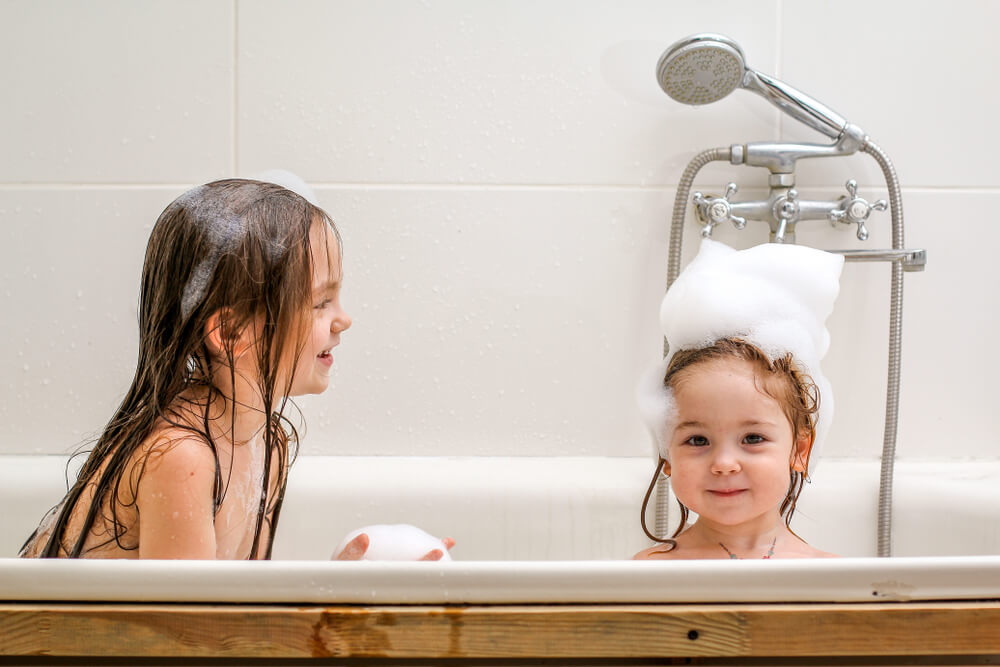
Prostock-studio/Shutterstock.com
Regardless of the age, personal hygiene includes taking care of our body. The primary idea of personal hygiene is to assist us in staying healthy and minimize the risk of ilnesses and other serious conditions.
A healthy personal hygiene routine will also ensure we maintain optimal appearances. For example, brushing and flossing teeth regularly is imperative to keeping our smiles beautiful.
Personal hygiene for kids involves participation of parents and other adults, which should help children to develop the right hygiene habits. As we know all too well, children are sponges for knowledge mimicking their parents, elders, and peers in an attempt to expand what they know. Little children are touchy-feely evolving from putting everything in their mouths to touching, grabbing, and holding indiscriminately. We’ll show you the best ways to handle hygiene and children no matter what age a focus on better hygiene started.
Why is it Important to Have Good Personal Hygiene for Kids?
Good health starts with proper self-hygiene. Keeping our bodies clean protects the immune system while upholding good general health by curbing the spread of germs and diseases in society. Children need to understand that not everything they come in contact with is completely safe, and they must learn how bacteria is spread so that they don’t compromise their own health or the health of others. Poor personal hygiene also has psychosocial implications leading to diminished confidence and difficulties interacting within society.
Hygiene definition for kids
Personal hygiene practices are the things that you do to keep your body healthy. Hygiene practices like washing your hands, bathing or showering, brushing your teeth, washing your face, cutting and cleaning nails, and other healthy actions prevent germs from entering the body and being spread to others. Good hygiene keeps your body functioning properly while sustaining a healthy appearance and helping you feel good.
Types of personal hygiene

Prostock-studio/Shutterstock.com
Personal hygiene for kids can be broken down into several basic categories. Here are the core concepts of hygiene that all children need to grasp.
Handwashing
During the pandemics, the importance of washing your hands was heavily advertised. And that’s for good reason because medical professional suggest that washing your hands regularly helps save lives.
Handwashing helps eliminate germs and bacteria, which minimizes the risk of them spreading to others. In children, it’s more common that they have dirty hands, with potentially dangerous germs there. They could touch their mouths or eyes with those dirty hands, and that could lead to various health problems.
The importance of frequent handwashing can’t be stressed strongly enough. Make kids understand the science behind why you need to wash your hands and when washing is needed. Once they grasp the logical understanding of how bacteria spreads and make a habit of keeping themselves clean, good personal hygiene will become a lasting natural part of life.
Oral hygiene
The basics of dental hygiene include flossing and brushing, and that’s true for all ages. It’s important to talk about the importance of oral hygiene to your kids. Tell them how small chunks of food can get stuck between our teeth when we eat, and they could lead do decay, which could compromise our smile. If they seem interested, you can take things one step further and talk about enamel, gums, and other details of dental hygiene.
You can start teaching children to brush their teeth at an age of three. However, experts don’t recommend them flossing on their own before they are at least six or seven. The critical thing to focus on is not to let them improvise—it’s important to brush and floss thoroughly for the process to have optimal effect.
All about baby teeth: when and how do they fall out?
Bathing
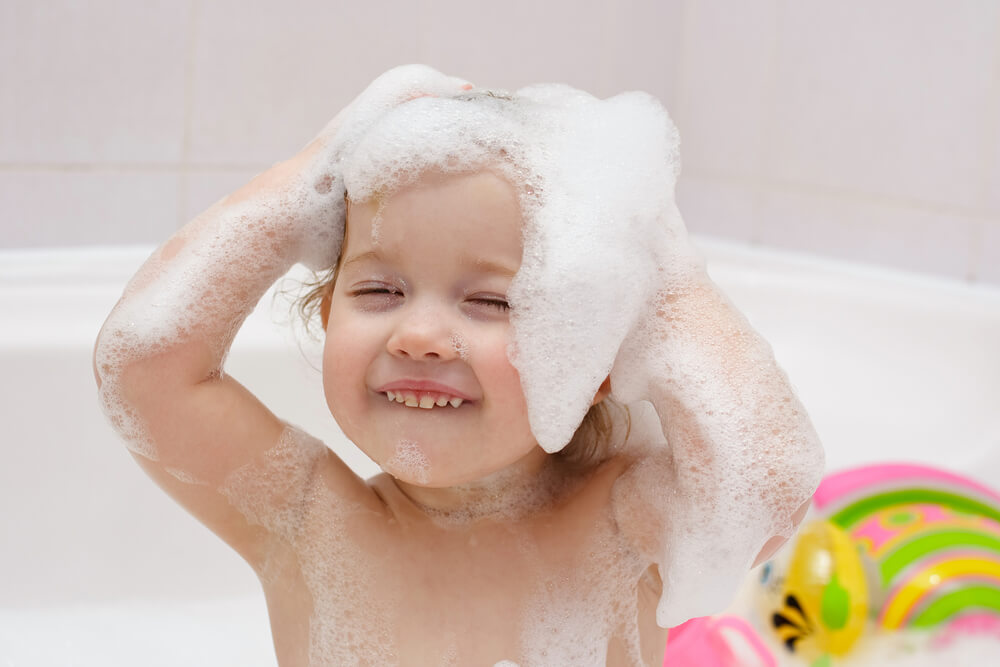
Prostock-studio/Shutterstock.com
Bathing or showering must be done at least once a day at the close of the day. Twice daily bathing is recommended. Most kids will be able to bathe or shower by themselves by the age of five. Ensure that they know how to wash everywhere and what proper self-care while bathing or showering entails. Kids must grasp the essential nature of washing between their fingers and toes, under the arms, washing their genitalia, and cleaning all other areas properly before they start washing alone.
Haircare
Children should be taught to wash their hair at least twice a week to keep it in good health. Teach how hair contains oils and how the root requires nourishment and moisture for healthy hair to thrive. Explain scalp health, and help them understand why sharing hair care products and equipment like brushes and combs with others is a bad idea. A thorough understanding of hair health will ensure that they don’t abuse their hair with chemicals, over maintenance, or poor hair and scalp care later in life.
Nail care
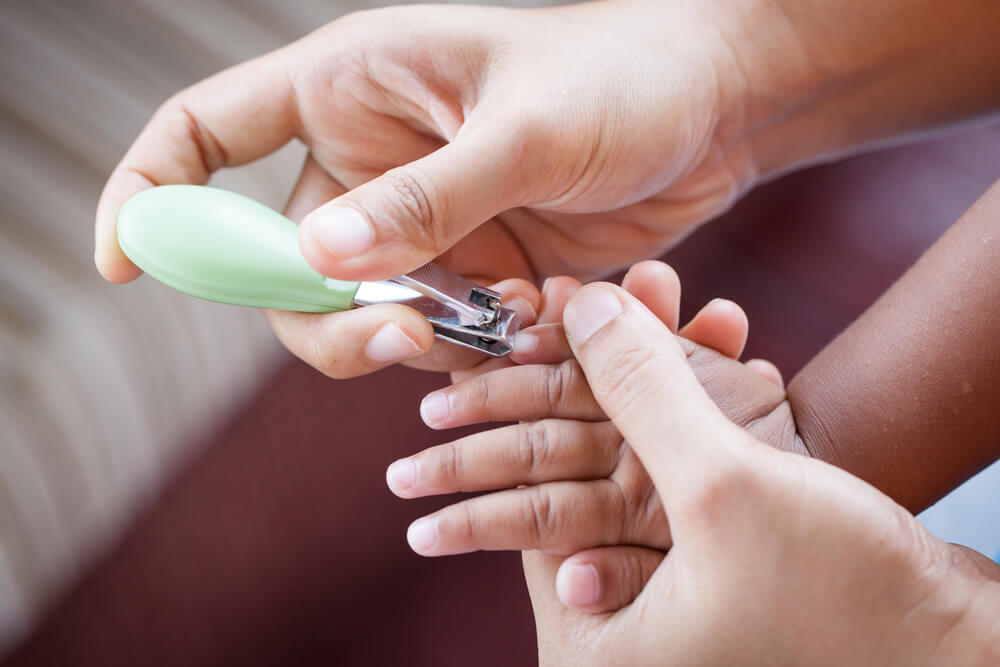
Prostock-studio/Shutterstock.com
Cleaning your nails daily should be a priority from a young age. Nails must be kept short, and kids need to learn to scrub under their nails, making sure that they’re spotless at all times. Nail-biting should be discouraged, but dirty nails make matters even worse, drastically raising the risk that bacteria will be ingested.
Toilet hygiene
According to experts, kids might not have control over their bladder and bowel movement until they are 2.5 years old, and it’s not uncommon for this to happen later. That’s why you don’t want to rush with toilet training, so wait until the child is at least three.
It’s important to ensure that kids can access the toilet by themselves. This means putting a child seat on the toilet, and ensure they have proper posture. It could help to set a bowel movement routine, preferably at times when you can control them to avoid constipation and similar issues.
Another smart tip is to talk to your child that they should drink water a couple of hours before heading to bed, and they should visit the bathroom before they go to sleep. Make sure to combine this habit with handwashing afterward, and emphasize that handwashing after going to the toilet is imperative.
Food hygiene
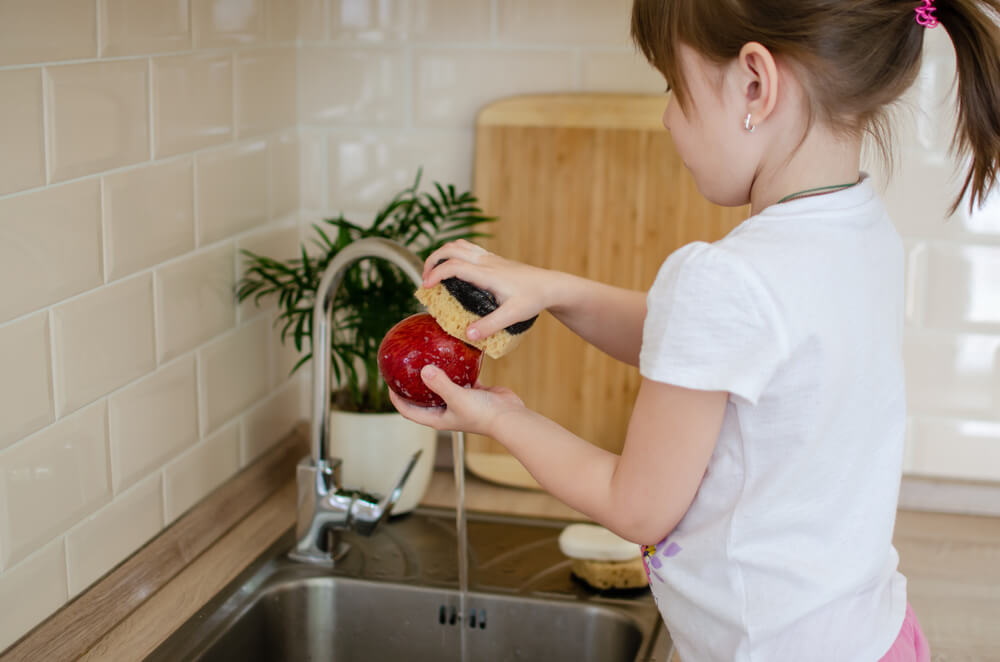
Prostock-studio/Shutterstock.com
Food needs to be clean before it’s ingested, and being clean before eating must become second nature. Food hygiene is of the utmost importance. Parents are encouraged to teach their children the origin of meat, vegetables, and other ingredients, instilling a full understanding of bacteria, the role of cooking meat, and cross-contamination. A child who grows up only ever eating clean food with clean hands in a clean environment will never allow things to be any other way.
Illness hygiene
Children who comprehend how illnesses are transferred will want to minimize their risk and the risk of others, actively enforcing illness hygiene habits learned. Back good hygiene education with a set of illness-preventing habits like covering your mouth with your elbow before coughing and looking down and away while covering your face whilst sneezing. Encourage the use of handkerchiefs or tissues. Teach them to stay out of contact with others when sick, and help them learn why a clean environment is extra important to prevent the spread of germs.
Domestic hygiene
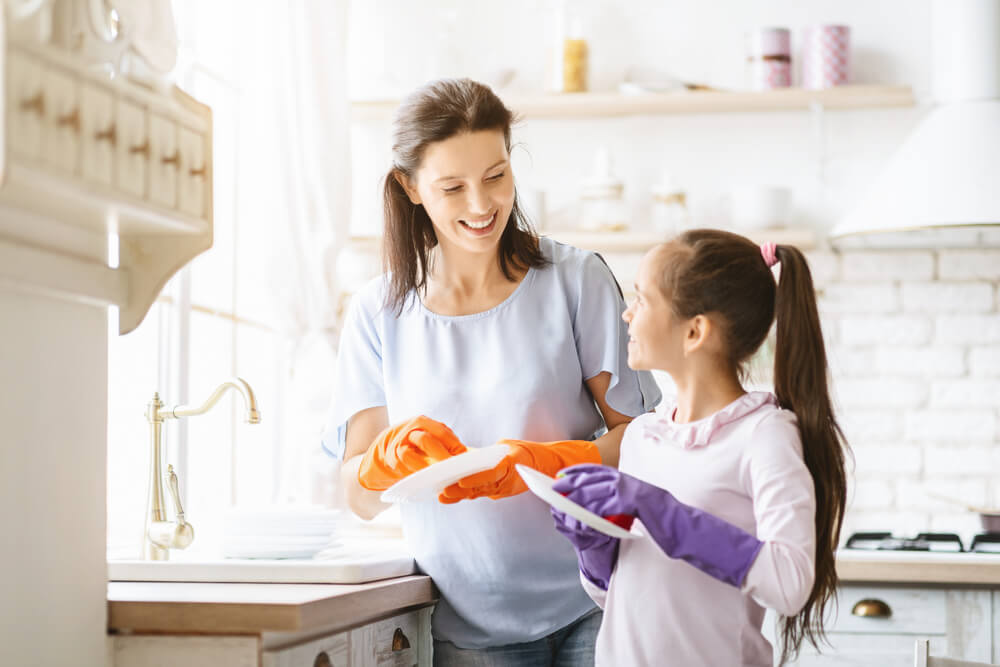
Prostock-studio/Shutterstock.com
Activities involved in keeping the household and your immediate environment clean are all a part of domestic hygiene. Ideally, by the time a child has reached adolescence, they will understand the role of washing household linens, clothing, cleaning surface areas, and maintaining hygienic conditions throughout everything they encounter. Domestic hygiene includes keeping a clean kitchen, sanitary floors, and clean living and sleeping areas.
Community hygiene
Teach your children to dispose of waste properly by making sure they understand the full complications of illegal dumping and discarding of waste improperly. Community hygiene covers caring for water and food sources, keeping the immediate environment clear from continents and miscellaneous waste, and respecting hygiene in public places. Hygienic behavior in public, waste disposal, proper ventilation, and education concerning the proper conditions for animal handling should all be taught from a young age.
Sleep hygiene
Kids often overlook sleep hygiene as a crucial part of their development. It’s no wonder that so many adults still don’t know how to get proper rest. Help your children understand the place of a healthy sleep schedule while forming good sleep habits—ready for bed at the same time each night and wake at the same time every day. As your child grows, they will need to shift their sleep times. Make sure the adjustment is gradual, and help them understand why changes to body rhythms need to be eased in.
21 Hygiene Habits for Kids
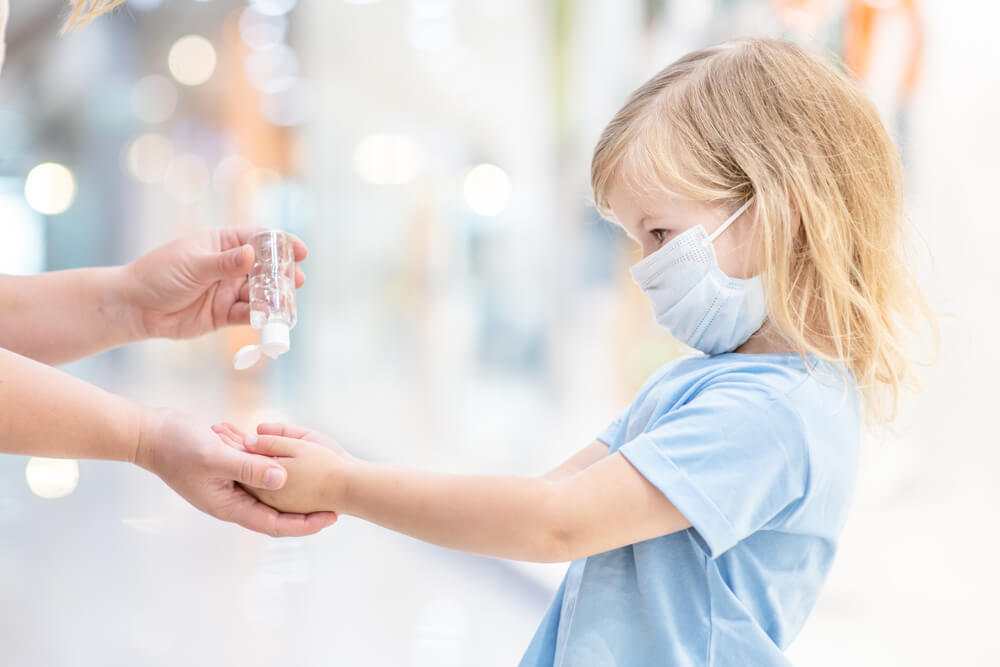
Prostock-studio/Shutterstock.com
The best personal hygiene choice will always be the one that keeps you and those in contact with you clean, safe, and healthy. The logic behind healthy personal hygiene habits comes naturally once one understands the many benefits and repercussions. There are, however, certain healthy habits that serve as a fantastic model for hygienic behavior.
Here are some of the healthiest personal hygiene habits for children to form:
- Healthy Procedures for Handwashing, Bathing, and Showering.
- Regular Frequent Handwashing.
- Handwashing After Touching Contaminated Surfaces.
- Handwashing After Using The Toilet.
- Handwashing Before Preparing or Eating Food.
- Handwashing After Touching Raw Meat.
- Handwashing After Touching Animals or Insects.
- Handwashing After Coughing or Sneezing.
- Handwashing After Coming Into Contact With Bodily Fluids.
- Twice-Daily Bathing or Showering.
- Twice-Daily Toothbrushing and Flossing.
- Good Nail and Toenail Care.
- Good Hair Care.
- Social Distancing From Those With Symptoms of Illness.
- Refraining From Touching Face.
- Refraining From Touching Mouth.
- Refraining From Scratching Sores or Irritated Skin.
- Sharing Food Conscientiously With Others (Taking Care Against Contamination).
- Wearing Fresh Clothing and Undergarments.
- Regular Cleaning and Maintenance of Personal Property.
- Healthy Sleeping Position, Hours, and Environment.
Poor Hygiene in Children
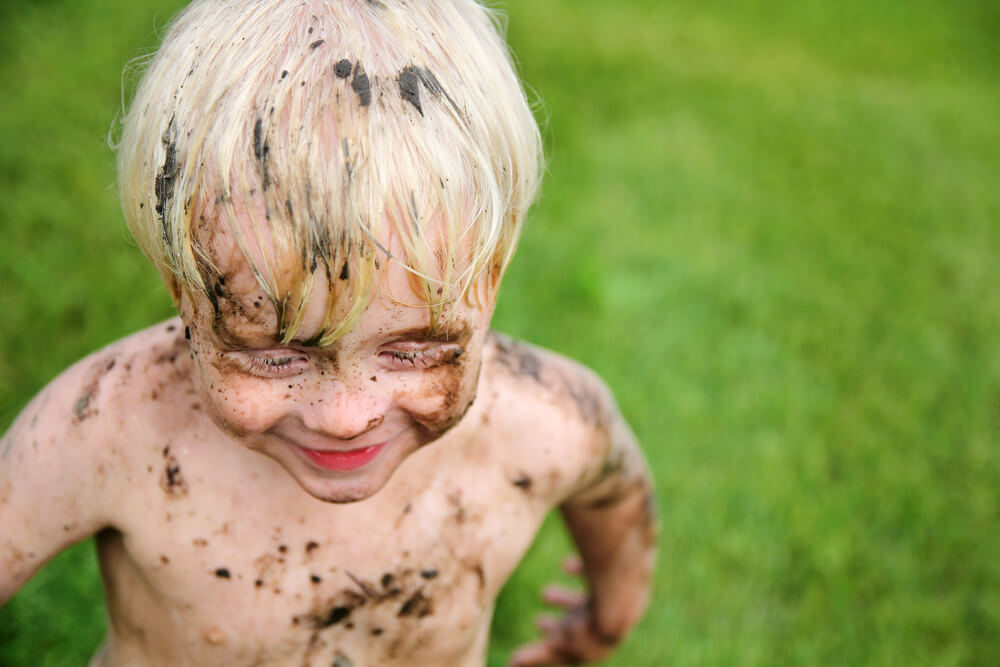
Prostock-studio/Shutterstock.com
It could be that they haven’t had a proper example so far, or perhaps they succumbed to peer pressure. Maybe your child still doens’t understand the importance of good hygiene, or they are in a rush to do other things and don’t consider healthy habits a priority.
Either way, it’s important to notice poor hygiene as soon as possible. That will help them discover why that’s happening. Try to offer support because kids tend to rebel for no reason, and if you react negatively, that could make them refuse even basic hygiene moves.
If this keeps happening for more than a few times, you should focus on potential underlying problems. These could be depression, social issues with peers, developmental disabilities, or other trauma.
How Do You Teach Child Personal Hygiene? Lifehacks for Parents
Make the time you spend teaching your kids good personal hygiene fun and engaging. Young children can be encouraged to remember their habits and the proper processes for handwashing, bathing, or nail care using songs and games. If a good attitude towards personal hygiene forms early in life, there’s less chance that the foundational habits will be forsaken as they grow older.
Self-care habits will be adopted as your child becomes more familiar with themselves. Instilling an understanding of good hygiene is the best way to empower your kids to make good decisions. When a competent child simply won’t adopt good hygiene, ensure that they understand the social implications. This includes both the demeaning nature adopted by others when faced with a slobbish person and the way that it affects their own self-perception, confidence, and affinity to grasp opportunities.
Tips to Explain Personal Hygiene to a Child
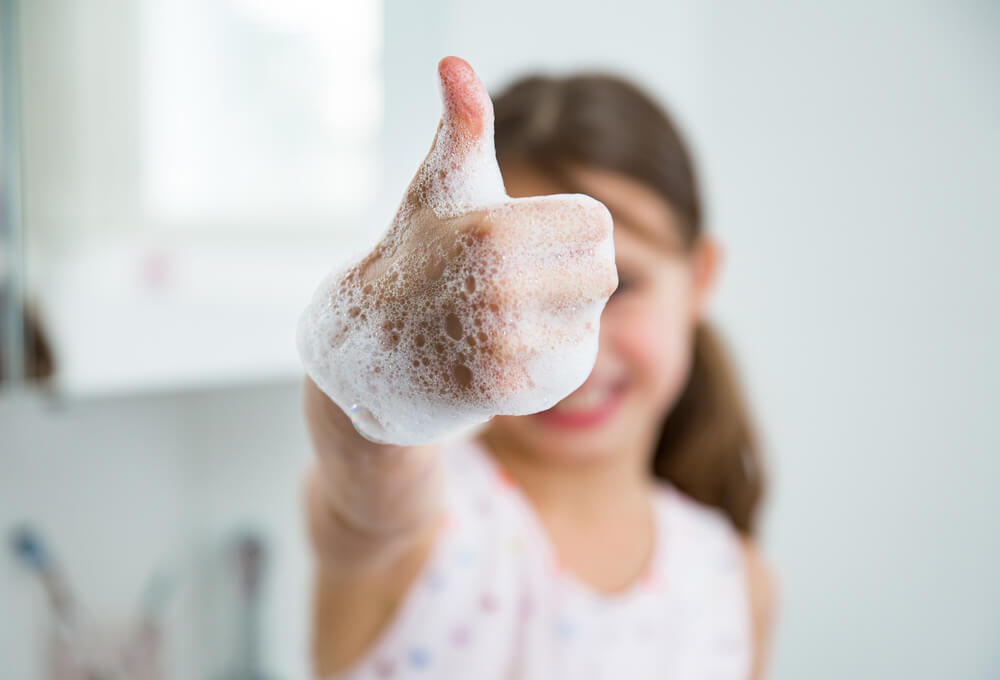
Prostock-studio/Shutterstock.com
We suggest that you use these core practical tips to shape a healthy mindset within your child or children.
Positive encouragement wins the war
Communication is the skeleton key to better relationships and bonding without words. Before you judge or discern the next best course of action, choose to encourage, motivate, and relate in an attempt to understand your child. Encourage positive hygiene, communicate and set a good example before all.
Shape a defining example
Kids look to you as their model for life. If you don’t uphold good personal hygiene habits, no amount of education, information, or pleading will get your child to behave in the way that you know is best for them. Examples are set early in life, so strive to live as healthily as possible, reinforcing your rules with an unwavering personal commitment to hygiene.
Create a routine they can relate to
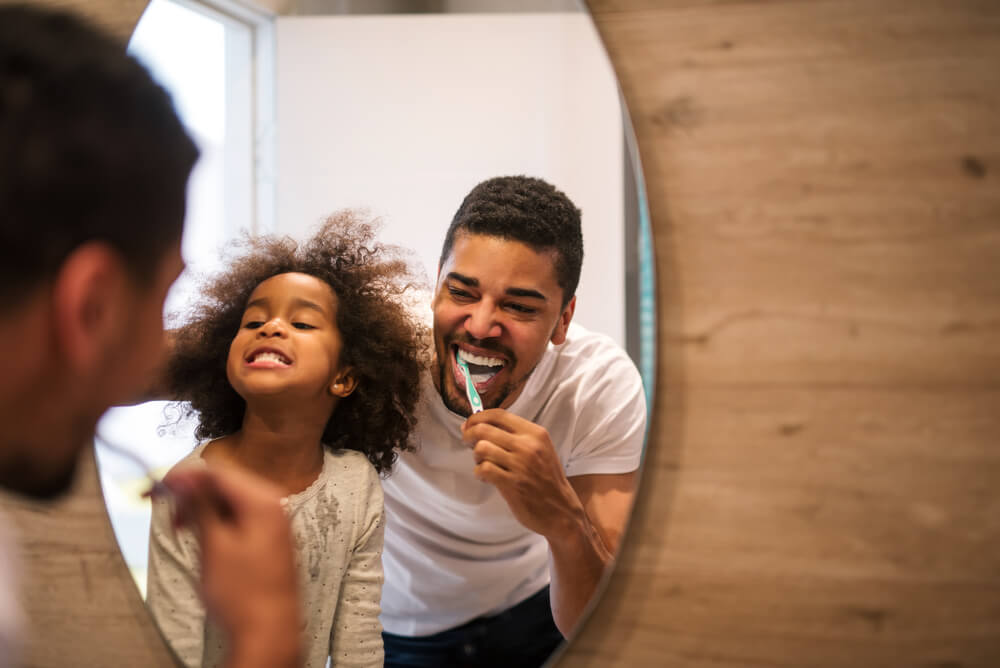
Prostock-studio/Shutterstock.com
Routine is easy to adopt if you’re driven and proactive. Set reminders and make following daily personal hygiene routines fun. The better you can decipher your child’s motivators and the thing they relate to, the better you can craft a routine that they’ll actively want to be involved in.
Make personal hygiene personable
We have an uncanny ability to make up our minds and stick to it no matter how silly the conclusion may be. Unless our children understand the fundamentals and science behind health and wellbeing, they will never adopt lasting beneficial personal hygiene habits. Make sure that their relation to keeping clean is one founded in understanding, using education as your primary leverage and motivation at all times.
Present ample opportunities for engagement within hygiene
Personal hygiene education is a necessity, but no one said that it couldn’t be fun. Find new ways to engage and motivate your kids. Advanced personal hygiene devices like a cutting-edge toothbrush, a Waterpik, or a foot spa can be used to coax your kids to be interested in keeping clean and healthy. There are tons of personal trackers, smartphone apps, and gadgets readily available to spark interest in personal hygiene.
Talk about the appearance and good and bad smells
Unfortunately, children are prone to teasing other kids if their clothing items have stains. That’s why you should talk to your kid about the importance of wearing clean clothes and keeping their appearance tidy. That doesn’t mean they don’t have the right to show off their style, but it’s important to cover the basics properly. That means their clothes shoudl be ironed and not stained.
Apart from wearing clean clothes, smelling fresh is imperative. You can start teaching kids about good and bad smells at an age two or three. Find a clothing item with a foul odor, and then clothes treated with a fabric softener to smell good. That should motivate the kid to clean up and make proper clothing choices.
Things to Avoid While Teaching Health to Children
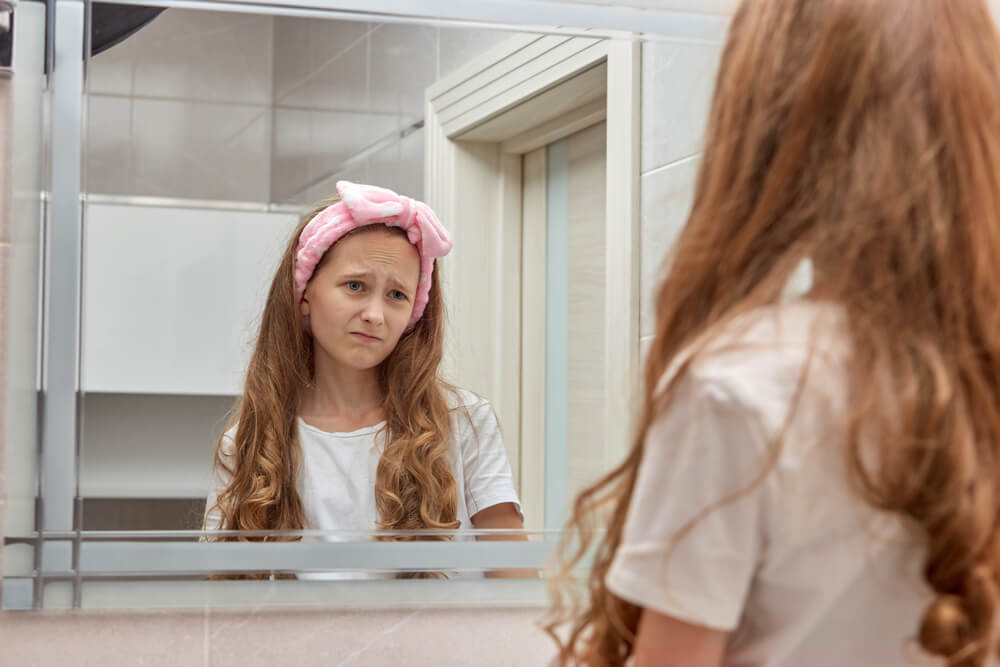
Prostock-studio/Shutterstock.com
Live by the healthy habits and mindset you are trying to instill in your children. Don’t allow a busy schedule or anything else to lead to set a bad example. If your kids see you bending the “rules,” they’ll find their own ways to break them. Shape a health-conscious family life, and the whole household will thrive, making healthy habits much easier to adopt.
Personal hygiene for kids may be of paramount importance, but please don’t police your children. If the attitude that follows personal hygiene is one of routine with a fear of punishment rather than an understanding and respect of health, no kid will keep up their habits. Approach hygiene from a positive perspective, leaning on the benefits of healthy living rather than making your kids cower from the consequences.
How to Teach a Child to Bathe and Shower Themselves
Regular bathing is the foundation of good hygiene, but it will take time and patience to teach your child how to bathe themselves. For starters, we suggest making the environment inviting and friendly. Instead of bathing being a chore, make it fun for the kid.
Lay out a selection of toys, favorite loofahs or washcloths, and all the body care products and washes that they love. Choose this together, but stick to toys that won’t be too distracting. Also, don’t forget the importance of safety. It’s best to use a small bathtub where your child can sit. Make sure to underline that they shouldn’t dive underwater, splash, or suddenly stand up since the floor is slippery.
You should be present and help your child bathe themselves as long as you are completely certain you can leave them alone. And even if you don’t assist, it couldn’t hurt to be present the first couple of times to see they are doing everything right.
Teach your child the proper process for bathing from young, and they’ll be bathing responsibly from about the age of five.
Here are the essential steps to a complete bath or shower to teach them:
- Begin by either shampooing or helping your child shampoo their hair.
- Rinse out the shampoo.
- Reapply shampoo—scrub, and lather well.
- Either help your child achieve a good lather using their favorite body wash or let them do it themselves.
- Ensure that ears, armpits, feet, bum, and groin are covered.
- Rinse out the shampoo and rinse the body clean.
- Apply conditioner working it into the roots.
- Use a finger pad or scrub to clean tails and toenails.
- Rinse all soap away
- Finally, rinse hair clean.
Don’t compromise on your child’s safety and well-being. Discover the power of Findmykids app—the perfect solution for tracking and protecting your little ones. Download the Findmykids app right now and enjoy the ultimate peace of mind!
Keep Providing Positive Support and Encouragement
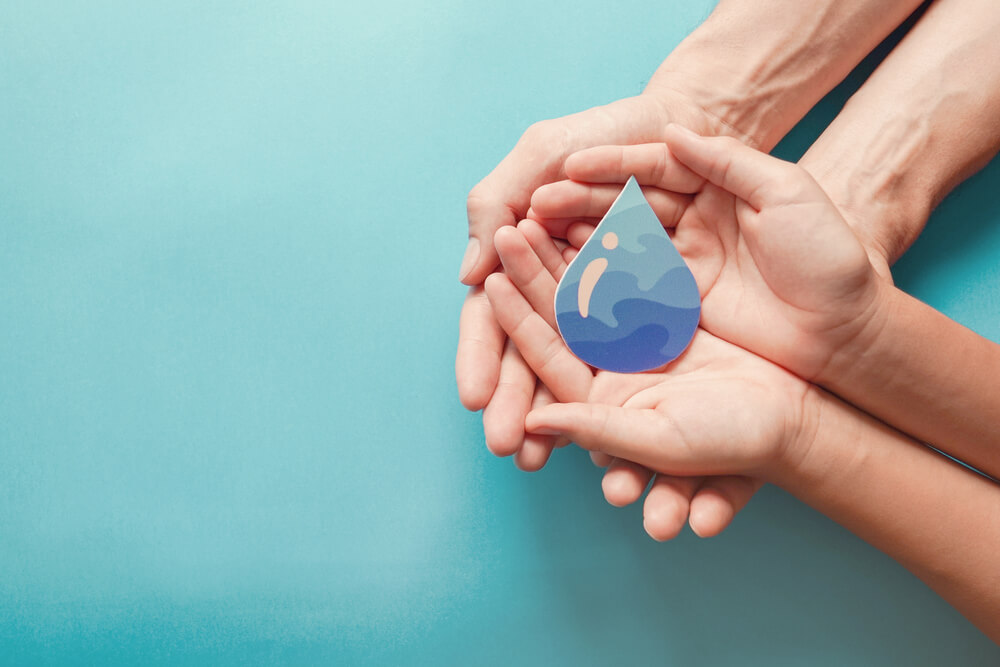
Prostock-studio/Shutterstock.com
Arm your kids with enough information and a good attitude towards personal hygiene, and they’ll make healthy choices all by themselves. How do you treat personal hygiene for kids within your family? Have you picked up any key communication tips? We encourage you to share your insight and advice in the comments section below.
FAQ
What are the 10 personal hygiene tips for kids?
You can learn more throughout our article, but here are the ten foundations to cover to develop good hygiene habits in children:
- Handwashing
- Bathing
- Brushing and flossing teeth
- Clean clothes and underwear
- Nailcare
- Facial care
- Not touching face, mouth, or irritated skin
- Preventing the spread of disease when you sneeze or cough
- Cleaning personal items
- Healthy sleeping schedule
At what age should a child be able to clean themselves?
Wiping themselves after going to the toilet and handwashing is something some kids can learn how to do when they are only 3-4 years old. Don’t rush with solo bathing as most children will be capable of then only when they turn eight. However, you can teach them how to brush their teeth and other hygiene habits sooner.
How do I teach my 10-year-olds hygiene?
The critical thing is to have patience and be persistent. You should talk about good hygiene habits with your child daily. Encourage them to wash their hands frequently, wear clean clothes, and be patient if they have any questions or you need to repeat the steps of a certain hygiene process multiple times
How do I teach my child the value of oral hygiene?
Experts suggest that you should start early as that’s the way for them to begin adopting the importance of developing oral hygiene habits. Make sure to set an example, and it’s best for brushing and flossing teeth to be a joint activity. Finding a toothbrush they like, such as one with a cartoon hero, and choosing a friendly testing can also help your kid to appreciate oral hygiene more.
Проверьте электронный ящик



















